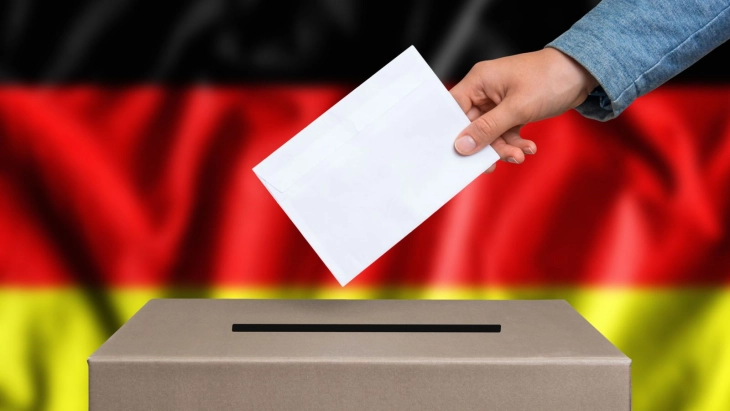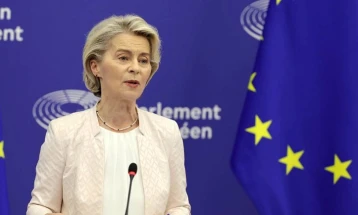Germany's far-right AfD gain big in closely watched state elections
- The far-right Alternative for Germany (AfD) made historic gains in a pair of closely watched state elections on Sunday, with preliminary results giving them a clear victory in Thuringia, while they were behind only by a narrow margin in Saxony.

Leipzig/Erfurt, 2 September 2024 (dpa/MIA) - The far-right Alternative for Germany (AfD) made historic gains in a pair of closely watched state elections on Sunday, with preliminary results giving them a clear victory in Thuringia, while they were behind only by a narrow margin in Saxony.
The AfD's win in Thuringia marked the first time since the defeat of Nazi Germany in World War II that a far-right party has won a statewide election in the country.
In Saxony, the incumbent centre-right Christian Democrats (CDU) secured a razor-thin lead over the AfD, according to preliminary results from the electoral office.
The election results - and subsequent coalition talks - will decide the balance of power in the state parliaments in Thuringia and Saxony, which each hold considerable power over regional matters.
The three parties in German Chancellor Olaf Scholz's squabbling and unpopular national coalition government, meanwhile, faced a rough evening with losses nearly everywhere.
The results could deepen fractures in the parties with just over a year to go until the next nationwide parliamentary elections in September 2025.
'Firewall' to keep AfD out of government
Despite strong gains, the AfD are to be well short of a majority and were unlikely to find coalition partners in both Thuringia and Saxony as politicians from other camps again denounced them.
Every other major German political party has categorically ruled out any cooperation with the AfD, and repeatedly attacked the AfD as too extreme and a danger to Germany's democratic traditions.
Both Thuringia and Saxony are in the former communist East Germany, where politics and voting patterns remain distinct more than three decades after reunification, and where outmigration and a lagging economy has helped fuel resentment.
The states are relatively small - together, they account for only about 7% of Germany's population - but the surging popularity of extremists in the AfD there has drawn widespread attention across the country.
Another insurgent populist party, the newly launched Sahra Wagenknecht Alliance (BSW) which combines anti-immigrant stances with left-wing economic policies, placed third in both states.
The CDU's national general secretary, Carsten Linnemann, hailed the election as a success saying it demonstrates that his party - unlike their centre-left rivals, the Social Democrats (SPD) - remain a mass party with broad support.
"We are a bullwark," Linnemann said on Sunday evening.
Turnout was high in both Thuringia and Saxony for the election, with 73.6% and 74.4% of eligible voters taking part respectively, significantly more than in the last state elections in 2019.
Voters in another eastern German state, Brandenburg, will elect a new state parliament on September 22, and opinion polls have put the AfD in the lead there as well.
AfD breakthrough in Thuringia
Preliminary results from the electoral commission put the AfD at 32.8% of the vote in Thuringia.
That gave the party a clear lead over the CDU, which collected 23.6%.
Nonetheless, the CDU's top candidate in Thuringia, Mario Voigt, claimed a mandate to form the next government in the state, since parties rejected election night overtures from the AfD out of hand.
Voigt said the election results called for political change in the state, which has been governed by a left-wing coalition led by Bodo Ramelow of the hard-left Die Linke (The Left) party.
Voigt said at an election evening party in the state capital of Erfurt that he plans on leading coalition talks to form a "sensible government in Thuringia under the leadership of the CDU."
The BSW came in third in Thuringia with 15.8% of the vote, according to preliminary results.
Ramelow's Die Linke finished fourth with 13.1%, a major slide from 2019 when the party led the vote with 31%.
Ramelow denounced the AfD and said Voigt now holds the responsibility for forming the next government on behalf of those who support democracy.
Scholz's Social Democrats collected 6.1% of the Thuringia vote.
His national coalition partners, the Greens and the pro-business liberal Free Democrats (FDP), fell short of the 5% threshold required to take seats in German elections.
The Greens finished with 3.2% of the vote, while the FDP trailed with 1.1%.
Tight race in Saxony
Preliminary results showed the CDU secured a narrow win over AfD in Saxony.
After all the votes had been counted, CDU secured 31.9% of the vote, the election office said, just ahead of AfD which received 30.6%.
BSW received 11.8%, while the SPD won 7.3%.
The Greens secured 5.1% of the vote, while Die Linke party slipped to 4.5% but will return to the state parliament after winning two direct mandates.
The CDU's incumbent state premier, Michael Kretschmer, said he plans to remain in office as the head of a new coalition after the election either way, although tough talks could lie ahead as his current alliance with the SPD and the Greens may no longer have enough for a majority.
Fiery far-right challenge draws headlines
The leader of the AfD's state organization in Thuringia, the firebrand Björn Höcke, has become a household name in the country because of his fiery attacks on immigration policy and his extremist rhetoric. He was twice convicted this year of knowingly quoting a banned Nazi slogan in speeches.
Domestic intelligence agencies have labelled the AfD's state-level chapters in both Thuringia and Saxony as known far-right extremist groups, and Höcke as an extremist.
The AfD again made overtures toward the BSW on Sunday night, and Höcke declared himself ready to form the next government in Thuringia. But the BSW's founder and namesake, Sahra Wagenknecht, blasted Höcke on national TV.
"Mr Höcke represents a völkisch [ethno-nationalist] world view, which is miles away from us," Wagenknecht said. "We have always said that we cannot work with Mr Höcke."







